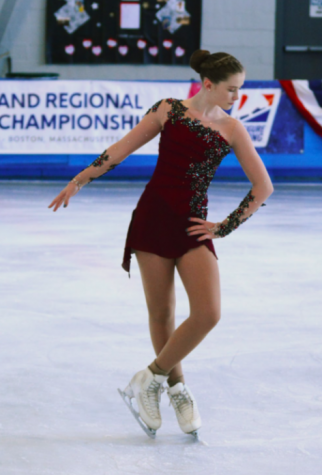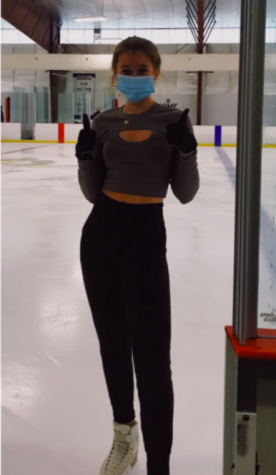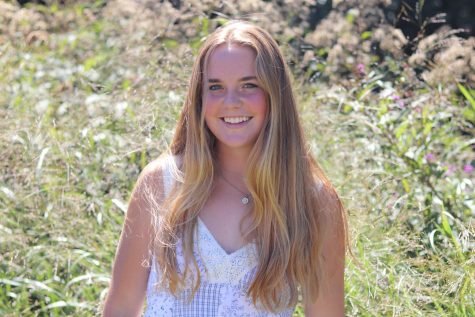Emily Grieco: Skating pushes you to work your hardest
Credit: Courtesy of Emily Greico
Sophomore Emily Grieco stands in her locker room before the New England Regional Figure Skating Championships. Grieco has a hidden talent for figure skating, an uncommon sport that has brought her many successes and has taught her many life lessons. “[I have learned] to work hard for the sport, and just in life in general,” Grieco said. “[I have also learned] how to train hard for things I want to accomplish.”
Sophomore Emily Grieco discovered her passion for figure skating when she first started at two years old. She went on to start competing at the age of five and continued around the country to compete in many different competitions.
“I have actually traveled for a competition [in] Virginia, and I have been to a bunch of places around New England,” Grieco said. “As a synchronized skater, [my team and I] competed in nationals, and we placed second. I have also competed in other bigger competitions as a solo skater.”
Many may consider skating as a complex sport, for it requires years of skill in order to master a jump. The jumps come with build-ups in order to accomplish the full skill. For example, an Axel is one and a half rotations in the air. After mastering this skill, skaters can work on many other types of jumps that the Axel prepares them for.

(Credit: Courtesy of Emily Grieco)
“I am now working on my double Axel and triple flip, which are pretty hard to get,” Grieco said. “A build-up to those are you can practice single Axles before a double. It’s really important that you can do a single axle well in order to learn a double Axel.”
Grieco skates for an individual skate group called Skate Kostin. She travels anywhere from one hour to 20 minutes to get to practice. While at practice, she trains for four hours with her teammates.
“I’ve practiced [skating] in Burlington, Acton and currently, I practice in Salem, New Hampshire,” Grieco said. “Usually per day over the summer I train around four hours: two hours on ice, two hours off.”
This level of commitment comes with a cost. Grieco’s mental stamina is put to the test as she trains. Skating comes with lots of bumps in the road, and sometimes these challenges can affect her mindset.
“[Skating] definitely [affects] a part of my eating, and how I eat, because you see all these little skinny skaters, and it has a weird effect on your mindset,” Greico said. “I definitely have come close to quitting. I actually took a two-week leave because I was just so upset about where I was.”
Nevertheless, Greico has surrounded herself with people who help pick her up when she falls.

“My mom talked to me about how hard I have been working, and that it was just a little bump in the road and that I was going to get through it,” Grieco said. “ [My coaches] really don’t give up on me, even when I’m not working as hard as I should be.”
Despite the plenty of difficulties that are faced when skating, the sport can come with many rewards as well. The harder one works, the more likely they are to see improvement in skills. Skating does not come naturally to everyone, and skaters often have to work hard for what they would like to accomplish.
“[I have learned] to work hard for the sport, and just in life in general,” Grieco said. “[I have also learned] how to train hard for things I want to accomplish.”
In solo skating, skaters do not compete together as a team, so they are left to compete for themselves. Often, solo skaters are looking to find an end goal for their careers. However, Grieco, at a young age, already has hers all figured out.
“I hope it brings me to a place where I’m just happy going to practice and training,” Grieco said. “Not necessarily doing well in competitions, but just being able to land all my jumps.”
Your donation will support the student journalists of Wayland High School. Your contribution will allow us to purchase equipment, cover our annual website hosting costs and sponsor admission and traveling costs for the annual JEA journalism convention.

Deirdre Brown, Class of 2023, is a fourth year reporter and co-broadcast editor for WSPN. She is captain of the field hockey team, and also plays on the...





![Last Wednesday, the Wayland School Committee gathered to discuss a number of topics regarding the health curriculum and Innovation Career Pathway course. Another large topic of conversation was the ways to potentially mitigate distracting cell phone usage. "These [phones] are going to distract your learning and social relationships," Superintendent David Fleishman said. "That's concrete right there."](https://waylandstudentpress.com/wp-content/uploads/2025/06/Screenshot-2025-06-04-at-9.49.31 PM-1200x886.png)



























![Troy Hoyt finishes the Boston Marathon, running for the Hoyt Foundation. T. Hoyt is the son of Hoyt Foundation CEO Russ Hoyt.
“[Running a marathon] might seem like a big thing, when it’s presented to you at first, but if you break it up and just keep telling yourself, “Yes, you can,” you can start chipping away at it. And before you know it, you’ll be running the whole 26 miles, and you won’t even think twice about it.” T. Hoyt said.](https://waylandstudentpress.com/wp-content/uploads/2025/04/C36E8761-1CBB-452E-9DF2-543EF7B1095E_1_105_c.jpeg)











































![Sophomore Emily Grieco stands in her locker room before the New England Regional Figure Skating Championships. Grieco has a hidden talent for figure skating, an uncommon sport that has brought her many successes and has taught her many life lessons. “[I have learned] to work hard for the sport, and just in life in general," Grieco said. "[I have also learned] how to train hard for things I want to accomplish."](https://waylandstudentpress.com/wp-content/uploads/2020/10/Screen-Shot-2020-10-14-at-10.50.53-PM.png)